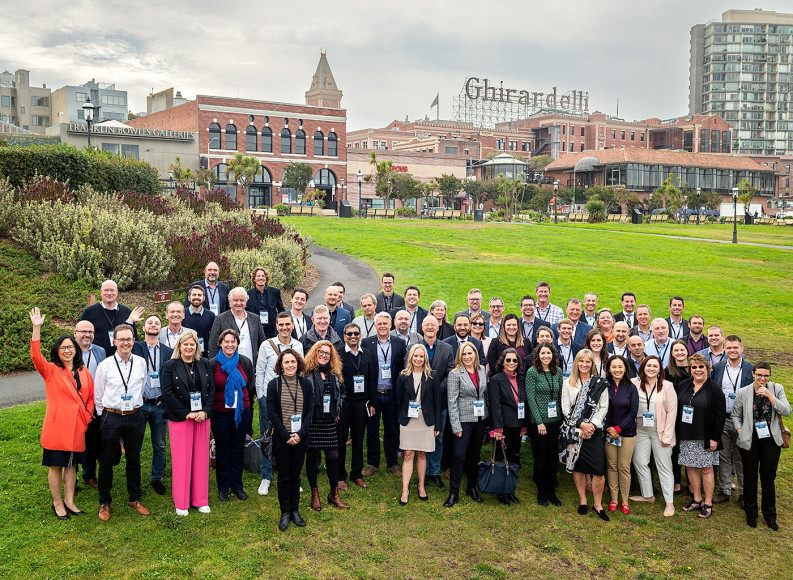On 31 October – 1 November 2022, Antea Group USA hosted the biannual Associate meeting for Inogen Alliance in San Francisco, California.
It was energizing and inspirational to hear from so many global colleagues across the Alliance. Our time back together once again emphasized the importance of in-person meetings. The Alliance’s core values and working model rely on these opportunities to renew and rejuvenate our friendships and partnerships across our trusted network. At this event, we had 25 countries represented with a wide diversity of technical expertise.
Our vibrant discussions culminated in a number of key themes including the dichotomy of global trends and current economic positions; the focus on digitalization, climate resilience, and ESG; the scarcity of talent and talent retention; and the return to traditional EHS and compliance as more companies return to workplaces or are learning how to manage hybrid work environments.
We would like to take this opportunity to share key messages coming from our diverse leadership across the world. We’ll focus on local and regional perspectives on the current business environments across our global network, as well as a few key insights we are hearing from multinational clients. Overall, there is a resounding acknowledgment that building a safer, cleaner, and more sustainable world will require more industry collaboration, a change in behavior on new evaluation systems, digitalization, and new skills in engineering our future.
“Inogen Alliance is building the foundation for sustainable change using our global expertise and influence where we can contribute to our collective future. We demonstrate daily our eagerness and ability to dip into a new future. One that requires innovation and forward-thinking in the current dynamic business environment. We need to understand how the world is shifting and moving outside our own backyards to understand the larger implications and respond to changing trends,” Angelique Dickson, President of Inogen Alliance.
We compiled business and industry trends across regions from a global panel of managing directors with a few excerpts in the North America region below (for more regional views check out the full blog here).
USA (Brian Ricketts, CEO, Antea Group USA)
In the USA, more multinational companies are looking at ESG requirements along with Energy Transition. ESG in some cases can be discretionary in the US; but if you look at the multinationals, a lot have operations in Europe where there are more requirements in this regard. Most multinationals are not going to plan/operate different ESG strategies in different regions, so we can expect to see more multinationals operate from a common ESG platform in the future.
“In these uncertain times, some companies won’t know what they should do or where they should go on their ESG journey in 2023, so they won’t do anything, and they’ll just stand still for a period of time. We can provide value to our multinational clients with our global view and guidance on what’s to come. Long term, the EHS&S industry outlook is very favorable, especially when you factor in Energy Transition and ESG. Our industry’s growth and profitability, along with being somewhat recession-proof, have caught the attention of private equity which continues to invest in buying firms as they long-term opportunity in the EHS&S market” Brian Ricketts, CEO Antea Group USA.
Before the Federal Reserve will begin to ease interest rates, it will take more massive layoffs and an increase in the unemployment rate. Right now, it’s still a very good job market; but when you look at the technology segment, some have stopped hiring and are making changes with personnel and programmatic spending.
Canada (Jennifer O’Grady, President, Terrapex)
In Canada, there have been labor market challenges in a few ways similar to the US, but Canada is calling it the great resignation with the baby boomer generation retiring now after the pandemic. Our government has historically relied heavily on immigration to fuel population growth, and that went downhill during the pandemic. They tried to fix it by changing the criteria you had to meet to be accepted as a Canadian immigrant; however, they didn’t have the staff to process applications, so there is a huge backlog.
There is a general consensus that a recession is coming and the overinflated real estate market in Western Canada and Southern Ontario is finally slowing due to inflation. Generally, we’re fortunate in Canada in that we’re not directly affected by geopolitical instability or war as other regions have been experiencing. The energy sector in Canada has of course been positively affected by increased oil prices. However, some oil and gas companies are not using their windfalls to invest in decarbonization; instead, they’re spending it on share buy-backs. There is also renewed interest in LNG production on the west coast, with the focus being on smaller plants that can be built more quickly to start exporting fuel to take advantage of this window of opportunity.
To read more regional perspectives from the meeting including the EU, UK, Brazil, Singapore, India, and Egypt, check out the full blog on the Inogen Alliance website.
Read the Full Blog HereWant more news and insights like this?
Sign up for our monthly e-newsletter, The New Leaf. Our goal is to keep you updated, educated, and even a bit entertained as it relates to all things EHS and sustainability.
Have any questions?
Contact us to discuss your environment, health, safety, and sustainability needs today.



